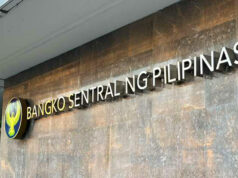Shorter loan payment moratorium pushed
LAWMAKERS are being urged to further shorten the proposed grace period on loan payments to 45 days, after the Bicameral Conference Committee working on the Bayanihan to Recover as One Act (Bayanihan II) bill agreed to cap it at 60 days.
Finance Secretary Carlos G. Dominguez III told reporters via Viber that a “maximum of 45 days (grace period) is better.”
For Bangko Sentral ng Pilipinas (BSP) Governor Benjamin E. Diokno, the two-month debt moratorium under the Bayanihan II is “a second best solution to a complex issue.”
“The first best option is not to mandate a one-size-fits-all moratorium. Leave to the banks the discretion to deal with the individual debtor, with the promise of some relief from BSP,” he told BusinessWorld in a text message on Sunday.
The central bank chief last week warned a one-year debt moratorium under the House version of the Bayanihan II will severely impact the banking industry in terms of liquidity.
“I’ll ask the BSP staff to do a stress test to have an informed analysis of the consequences of the compromise version,” Mr. Diokno said on Sunday.
The office of Senator Juan Edgardo M. Angara said the 60-day grace period approved by the joint panel on Friday “will cover everything, including credit card bills.”
Business groups were pushing for the Senate version of Bayanihan II, which provides for a 30-day grace period for loan payments.
Management Association of the Philippines (MAP) President Francisco “Francis” E. Lim said the 60-day grace period on loan payments is “a good compromise… provided that it is a one-time and non-extendible payment moratorium.”
Mr. Lim said the moratorium should not include payments to insurance and pre-need companies as this could hinder their ability to service claims amid the pandemic.
Chamber of Thrift Banks Executive Director Suzanne I. Felix said the industry will abide by the Bayanihan II’s provision on a loan moratorium.
“The option lies with the borrower to either repay the loan during this moratorium as per the actual due dates or avail the benefit of the moratorium,” she said in an e-mailed response to BusinessWorld.
On Friday, the Bankers Association of the Philippines (BAP) said it supports a 30-day grace period for areas under an enhanced community quarantine (ECQ) and modified ECQ. Metro Manila and nearby provinces are currently under MECQ until Aug. 18.
The Bicameral Conference Committee is currently working to reconcile the House and Senate versions of the Bayanihan II, which forms part of the overall stimulus plan to recover from the crisis brought by the coronavirus disease 2019 (COVID-19) .
FUNDING
Meanwhile, the Senate agreed to raise the funding allocation under Bayanihan II to P162 billion, following the House’s version.
“Nagkakasundo ang dalawang panig na siguro aabot tayo sa P162 billion. Pumapayag ang Senado na itaas ang total budget ng Bayanihan II sa P162 billion (Both sides agreed that we might need up to P162 billion. The Senate is amenable to increase the total budget of the Bayanihan II to P162 billion),” Senate Minority Leader Franlin M. Drilon said in a radio interview.
In its version, the Senate provided for a P140-billion standby fund, consistent with the Department of Finance’s stimulus plan.
Mr. Drilon, who is part of the bicameral panel, said they have agreed to allocate P10 billion for COVID-19 polymerase chain reaction testing, P15 billion for a cash-for-work program, and P17 billion for employees in affected small businesses.
Another P17 billion will be allocated to help the agriculture sector, and P10 billion each for transportation and tourism. Mr. Drilon said the panel has yet to settle whether the tourism assistance will go to infrastructure or as direct aid to businesses.
Meanwhile, the final version of the proposed Bayanihan II will determine if there is a need for the House to pass other measures for the banking industry.
The House version of Bayanihan II, in particular, incorporated key features of the bills on Financial Institution Strategic Transfer (FIST) and Government Financial Institutions Unified Initiatives to Distressed Enterprises for Economic Recovery (GUIDE).
“Kung maipasa sa Bayanihan, hindi na ’yan i-endorse (If passed under the Bayanihan, it will no longer be endorsed),” Quirino Rep. Junie E. Cua, who chairs the House Committee on Banks and Financial Intermediaries, said over the telephone on Sunday.
Mr. Cua, who is also a member of the bicameral panel, noted that if the joint panel decides against adopting these provisions under the Bayanihan II, then the pending FIST and GUIDE bills will be revived.
The GUIDE bill is awaiting plenary sponsorship after hurdling the House Committees on Banks, Ways and Means and Defeat COVID-19. The FIST bill, meanwhile, has already been approved by the House.
The FIST bill will allow banks to transfer bad loans to asset management companies, intended to unburden the banking system and encourage lending activities.
The GUIDE bill will increase the maximum loan guarantee coverage per borrower to benefit micro, small and medium enterprises affected by the pandemic.
The Senate version of the two bills are pending at the committee level. — Luz Wendy T. Noble, Beatrice M. Laforga and Charmaine A. Tadalan



